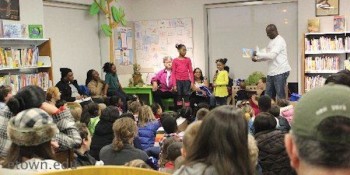The Modern Urban Gentleman character is a fine vehicle to express thoughts about fashion, travel, brewing, or any of the other elements that enrich one’s own life. Today, however, I am stepping out of that voice to share my thoughts about and experiences with an aspect of being a gentleman that exists outside of “self.”
In the first edition of this column, I defined a modern urban gentleman, in part, as a man who is “engaged in the community and the world.” That means following current events, surely, as well as formulating informed opinions about those events. It means fighting the battles for hearts and minds in support of the ideals we understand to be at the root of our opinions. But it means something more, something deeper, something — for me at least — much more difficult.
It means giving of oneself to make a tangible difference. It means walking the walk instead of just talking the talk.
In the past several weeks, I have had two opportunities to volunteer and engage with the community around me. In both instances, I interacted with students in classrooms, sharing insight, discussion, or just a few minutes of my time with them. Those moments reinforced to me the vital, unavoidable role a gentleman plays in the cohesion, advancement, and success of our society.
The American Literacy Corporation, based in Harrisburg, Pa., is a nonprofit group that organizes a weeklong campaign to recruit 500 men to read to area school children during the school day. I participated in this year’s 500 Men Reading Week by visiting three classrooms at the Foose Elementary School in Harrisburg. I volunteered because I could come up with no good reason not to — hardly the most inspiring motivation, but an effective way to kick-start a part of my self-improvement that has lagged behind the rest.
The importance of the 500 Men Reading Week was really driven home to me when I learned that only 18.3 percent of elementary and middle school teachers are male. Even more startling, only 2.3 percent of kindergarten and preschool teachers are men. Combine that with the particularly high rate of single-family households in the Harrisburg School District and I realized I may have been the only male role model those children would have that day. I do not yet have any children of my own, and despite having two younger brothers, the weight of that responsibility was a new experience.
The novelty of having a man in the classroom was evident, as the kids were so eager to engage me in conversation about everything from the dog in the book I was reading to whether my knit tie was actually a sock (complete with an entire class of second graders touching the material just to be sure). Regardless of their intelligence or boisterousness or attention span, those kids knew something fun and good was happening that day. In the end, I settled on feeling pride in having all those pairs of eyes looking to me for guidance.
In my other life, as a workaday public servant, I am the chairman of my organization’s Diversity and Inclusion Council. Owing to that role, my fellow officers and I were invited to participate in the annual Diversity Day at Mechanicsburg Area Senior High School. The event was put on by the school’s student-driven Diversity Club. The club brought together individuals who contribute to the diverse tapestry of life across south-central Pennsylvania, whether through vocation, avocation, or cultural background.
My colleagues and I presented a crash course on “Civil Rights Today.” I talked about the definitions of diversity and civil rights and then, in the ultimate manifestation of colorblind casting, I played the role of Barack Obama in a skit that emphasized the continuing relevance of the struggles of civil rights titans including Susan B. Anthony. A. Philip Randolph, Linda Brown, and Matthew Shepard.
We presented to four classes, ranging from sophomores to seniors, and were treated with nothing but respect. Sure, a few nodded off and some eyes glazed over at various times, but when they refocused, they genuinely tuned in and engaged the material at some level. The relevance of the murder of Shepard for being gay particularly resonated in the cyber-bullying reality of modern high school. As we found our rhythm by the third class, the presentations were ending with spirited debate among the students, with each individual’s personality shining through.
I walked out of that high school last week not feeling like I changed any lives, but feeling like I was able to make the tiniest ripple in the mental and social development of about 120 teenagers. By breaking the monotony of their day, as well as my own, our brains and our spirits were primed to welcome a new perspective on this shared journey we are traveling.
I don’t tell these stories today to draw attention to myself. The truth is, I have ignored this aspect of being a gentleman for far too long, and will surely skip out on far too many opportunities to embody the spirit of community in the future.
But it is essential to reflect on this often overlooked facet of what it means to be a man. I hope my words today will move just one person to say yes to an invitation to spend time doing something for the greater good. A fine gentlemanly life holds no true enjoyment without a rich, vibrant, empowered community to share it with.
